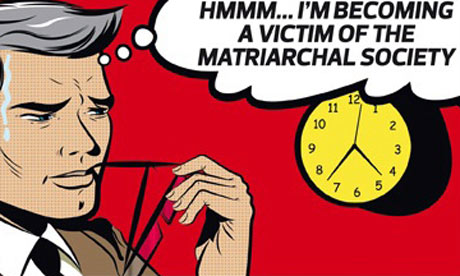A handful of statistics seems to bear out their thesis. Not only are men more likely to be conscripted into military service, to be the victims of violence, and to lose custody of their children in the event of a divorce, but tests conducted in 2009 by the programme for international student assessment, carried out by the OECD thinktank, showed that boys lag a year behind girls at reading in every industrialised country. They work longer hours, too: in 2010 the Office for National Statistics found that men in the UK work an average of 39 hours a week, compared with 34 for women. Healthwise, men develop heart disease 10 years earlier than women, on average, and young men are three times more likely to commit suicide.And like Farrell, Benatar jumps the shark when he argues that "our ignorance of the "second sexism" stems from what he terms "partisan feminists", who are interested only in the advancement of women's rights, rather than true equality and co-operation between the sexes." Blaming feminists is misguided and wrong-headed, as I will explain below.
Lagging at school, the butt of cruel jokes: are males the new Second Sex?
They work longer hours, face economic insecurity and suffer worse health. Now their feckless ways are lampooned in the media. A controversial new book argues that men increasingly face a prejudice that dare not speak its name.

Elizabeth Day
The Observer, Saturday 12 May 2012
Men are the victims of reverse sexism, according to a new book.
You might not have realised it, but men are being oppressed. In many walks of life, they are routinely discriminated against in ways women are not. So unrecognised is this phenomenon that the mere mention of it will appear laughable to some.
That, at least, is the premise of a book by a South African philosophy professor which claims that sexism against men is a widespread yet unspoken malaise. In The Second Sexism, shortly to be published in the UK, David Benatar, head of the philosophy department at Cape Town University, argues that "more boys drop out of school, fewer men earn degrees, more men die younger, more are incarcerated" and that the issue is so under-researched it has become the prejudice that dare not speak its name.
"It's a neglected form of sexism," Benatar says in a telephone interview. "It's true that in the developed world the majority of economic and political roles are occupied by males. But if you look at the bottom – for example, the prison population, the homeless population, or the number of people dropping out of school – that is overwhelmingly male. You tend to find more men at the very top but also at the very bottom."
The American men's rights author Warren Farrell calls it "the glass cellar". There might be a glass ceiling for women, Farrell once told the Observer, but "of the 25 professions ranked lowest [in the US], 24 of them are 85-100% male. That's things like roofer, welder, garbage collector, sewer maintenance – jobs with very little security, little pay and few people want them."
Read the whole article. For an annoyingly dismissive view of the book, see Suzanne Moore and her article The Second Sexism is just victim-envy.
Jayson's post generated a lot of discussion - so I weighed in with my own two cents, which read as follows (edited into proper(ish) grammar):
Where Warren Farrell goes awry is in not seeing that the men suffering under patriarchy, in all the ways he outlines in his many books, is a class issue. Wealthy, mostly-white men rule the culture - poor men have always suffered a lot, and poor men of color have suffered the most (often much more so than women) because they are seen as expendable in so many ways.
The existing (patriarchal, for lack of a better word) structure is based on power/wealth differentials, traditional cultural values (women should raise the children, men should do the hard and dangerous work), and the subtle ways that biology (males are more aggressive, stronger, and bigger) combines with innate character differences (men in general like to fix problems quickly and with little discussion).
The last 50 years has seen an effort to change these assumptions and basic structures, but because so few people were willing to acknowledge and address the role that wealth and power play in the subjugation of men and women, the "solutions" have tended to place not-wealthy males at even more of a disadvantage. We see this the most in how educational approaches are designed to favor female behavior patterns (girls brains are ready for reading skills way before male brains - female children are often better able to sit and work while male children need to burn off energy periodically or they cannot focus, and so on) - so now we have males essentially failing to get to college while females are excelling as never before.If we hope to fix these problems, we really must get real about the distribution of wealth and the role that plays in all forms of inequality. And we must stop blaming each other - this is not a man/women problem, it is a human being problem. Solutions will necessarily involve men and women working together to change the socialization process, the educational system, the economic system, and even the health care system - it's a bio-psycho-social-systems issue, and the solutions must be in accord with that reality.

No comments:
Post a Comment